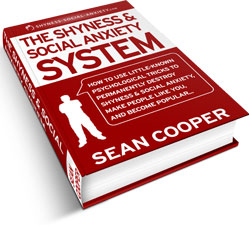So you discovered that you’re kind of, sort, of, maybe, definitely shy. How do you feel about it? What are your thoughts about it?
As a confidence and communication coach, I’ve talked and worked with hundreds of shy and socially anxious people. I’ve discovered they have all sorts of attitudes towards their shyness, and their attitudes drastically affect what they do about it.
There are clearly attitudes towards shyness I would call healthy, realistic and useful based on their effects, as well as ones I would call unhealthy, unrealistic, and mostly useless. I’d like to talk about some key attitudes of the former type, which I encourage you to adopt. They constitute a constructive, reasonable way to answer the question: “Is is okay to be shy?”
Being Shy Does Not Make You a Loser
Many shy individuals feel like complete losers because they are shy. At some level, some even deem they don’t deserve to be happy, loved or successful since they are shy. To them being shy is worse than being a leper.
This is a faulty way to view shyness. If you think about it, shyness is merely a personal trait that creates some negative consequences for one’s social and emotional life. Call it a flaw or a shortcoming if you will. Nevertheless, it’s only one single flaw, even if it can carry a heavy cost. It does not define you as a person and it does not make you a loser.
 In fact, most shy people I coach have a bundle of amazing qualities. They are often intelligent, well-educated, creative, hard-working, reliable and caring individuals. And they are also shy. It’s just a flaw in a whole constellation of personal traits; nothing more.
In fact, most shy people I coach have a bundle of amazing qualities. They are often intelligent, well-educated, creative, hard-working, reliable and caring individuals. And they are also shy. It’s just a flaw in a whole constellation of personal traits; nothing more.
By thinking that being shy makes you a loser, you’re only adding pointless frustration, guilt and sorrow to your life. Also, this belief makes you even more insecure socially (because, you know, you think you’re a loser not worth talking to), so it adds another layer to your shyness. If you have this belief, it’s crucial to let go of it.
Shyness Does Create Complications in Life Though
Although many people think they’re losers because they’re shy, there are also many people in the mindset that being shy is not a flaw in any way, so they shouldn’t try to do anything about it.
Some of them almost try to wear their shyness as a badge of honor. Some claim that “people are stupid and boring anyway”, so there is no point in trying to become more social, and they attempt to make themselves feel superior for being loners.
In my view, this attitude is even worse. It’s one thing to accept shyness as only a shortcoming and not feel ashamed of it; it’s another to deny entirely its negative consequences.
Shyness does create real problems in life. Shy people have a hard time building deep, genuine relationships with others, which are critical for our life satisfaction. They often feel lonely and depressed, they squander their potential in the workplace because they don’t make themselves heard or noticed, and they miss out on a lot in life.
As for the idea that other people are too stupid to be worth socializing with, that’s a sweeping generalization some shy individuals use as an excuse and a shallow source of solace. The truth is there are many cool people out there. But it’s much easier to judge others than to face your fears and work on overcoming them.
Do not attempt to deny the cost of shyness. It will make you miss out on so much in life, hiding behind a wall of rationalizations, when you could be doing something about your shyness and enjoying life much more. Which brings me to my next point.
It’s Possible and Worth Trying to Overcome Your Shyness
Fortunately, personal traits can be changed. The human psyche is fairly flexible. We can develop new thinking and behavioral habits, and with them new emotional reactions. More specifically, we can successfully overcome shortcomings such as shyness and social awkwardness.
Many shy people struggle in trying to overcome their shyness, but many of them succeed as well. As a confidence and communication coach I’ve seen hundreds of shy people who’ve entirely freed themselves from the shackles of shyness. The difference that makes the difference is twofold:
- The latter type of shy people had the right techniques and advice, whereas the former just used cheesy, simplistic and ineffective self-help tips.
- They applied this advice consistently over a period of time, until they achieved the level of social confidence they desired.
I’ve been coaching shy people since 2008. Based on my years of experience, I’d like to show you how you can overcome your shyness as effectively as possible.
This is why I’ve created a special instructional video in which I discuss the sources of shyness, as well as my tried and tested, step by step method for overcoming shyness. Go to this page to watch the video right now.
Also, I suggest you join my free social confidence newsletter for regular and practical advice from me, which I’m sure you’ll find very useful as you work on improving your social life.
Being shy does not make you a loser, and shyness is not a disease. However, it is a psychological condition with many nasty consequences, and it’s worth working to overcome it. You can do it. It all starts with making a firm decision to do something about your shyness, and do something smart.
 Second of all, it’s worth mentioning that you can’t really fake social confidence. Shy and socially anxious people would like to believe that they can just act as if they’re not shy, and that will quickly fix how they come across, without the need to address the deeper issue. But that doesn’t really work.
Second of all, it’s worth mentioning that you can’t really fake social confidence. Shy and socially anxious people would like to believe that they can just act as if they’re not shy, and that will quickly fix how they come across, without the need to address the deeper issue. But that doesn’t really work.
 If you’re shy and interested in finding a job, you may be wondering: What are some good jobs for shy people?
If you’re shy and interested in finding a job, you may be wondering: What are some good jobs for shy people? Working with shy people, I’ve noticed that without exception, they have a way of seeing themselves and seeing social interactions that is largely inaccurate.
Working with shy people, I’ve noticed that without exception, they have a way of seeing themselves and seeing social interactions that is largely inaccurate.
